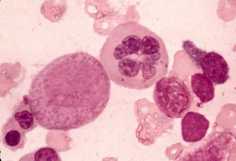 Aplastic Anemia is a rare blood disorder in which the bone marrow does not make enough new blood cells. When it comes to normal anemia, the individual does not produce enough red blood cells. With Aplastic Anemia, the individual does not make enough of all types of blood cells, this includes white blood cells and platelets. The life span of red blood cells is around 120 days. White blood cells live less than one day, and platelets live around 6 days. All of these blood cells must constantly reproduce and make new cells in order for the body to function as it should. When the body is unable to make new blood cells, several health problems could occur. What causes Aplastic Anemia? The cause can be either acquired or inherited. Individuals who acquire Aplastic Anemia may have done so by the following:
Who is 'at risk' for Aplastic Anemia?
Symptoms of Aplastic Anemia Those who have a low red blood cell count may experience fatigue, dizziness, shortness of breath, pale skin, chest pain, coldness in hands and feet, irregular heartbeat. Those who have a low white blood count may experience fever, infections, and flu symptoms that may linger for a long time. Those who have a low platelet count may experience nosebleeds, bloody stools, and bleeding gums. How is Aplastic Anemia diagnosed? If your physician suspects that you may have Aplastic Anemia, they may refer you to a hematologist for further evaluation. Your doctor will ask about your medical and family history. They will inquire about your symptoms, and conduct a physical examination. Next, your doctor will order a blood test and will look at your complete blood count. Other tests include:
Treatment for Aplastic Anemia Treatments for Aplastic Anemia may include:
**I included Aplastic Anemia in this series due to the disorder's relationship with autoimmune disorders. It is important for those of us with autoimmune diseases, specifically those with Lupus and RA, to know what we are at risk for if we don't adhere to our treatments.** If you suspect that you might have Aplastic Anemia, contact your doctor right away.
0 Comments
Your comment will be posted after it is approved.
Leave a Reply. |
Archives
|
©2017-2024


 RSS Feed
RSS Feed
